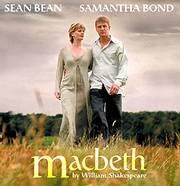Macbeth Albery Theatre 2002
At last a Macbeth worthy of our times. Those who fret about ageing demographics in West End theatres may sleep a bit more easily after seeing this youth-orientated version of the Scottish play. No one, to be sure, will sleep during the production itself. From its opening cracks of thunder through its periodic bursts of amplified music to its final clanging swords and gunshots, this production keeps the ear alert. And the eye, too, will be treated to what contemporary mass culture most prizes: an almost uniformly attractive and youthful cast, directed to titillate our media-trained gaze. Take the witches. No bearded women these, but instead three lovely and flimsily clad young women, who, in their second meeting with Macbeth, entwine his naked torso like a triple vine to his gym-sculpted elm. The casting of Sean Bean and Samantha Bond all but guarantees a full and doubtless young house, whose devotion will not go unrequited. We get more than an eyeful of these glamorous actors in the postures of contemporary celebrity culture. Samantha Bond in a clinging gown, Sean Bean in a see-through shirt, the two of them rolling about on the bed in their steamy first encounter: director Edward Hall has decided to give us the Scottish couple he thinks we deserve -- athletic, aggressive, and ready for their close-ups.
The surprising thing is that the production succeeds, if by success we mean we have a good time. For there is something to be said for a lively cast undertaking a Macbeth that crackles and pops, rather than broods on states of moral consciousness. The characters stride the blast like naked newborn babes, most of the time at the front of the stage. And it has to be said that every line is clearly spoken, even if a lot of the text has been cut. It all feels exceptionally well rehearsed, and there's a lot to commend its attention to stagecraft. The lighting is dramatic to the point of exaggeration, flashing and strobing and keeping us on the verge of excitement. The entire production seems set in a Soho club, as its swirling lights periodically focus on vigorous young people who emerge from the gloom and then disappear into the mostly hammered metal of the weirdly urban landscape around them. We see an array of nocturnally clad characters, mostly in dark colours, in leather, in clinging satin, silk, even the odd fur. We may actually like this homicidal couple, for they resemble the products of the world we live in. No layers of subtlety, no ethical agonies, no painful deterioration affect these Macbeths. They begin on the surface, and they stay there. Nothing is nuanced, nothing is probed.
As for the acting, again we get what our times demand. Bean makes a remarkably untroubled Macbeth. He tends to yell out his lines, although it must be said he speaks every phoneme with clarity. But his variegated Northern accent hampers him, for it often sounds as though he has to concentrate on sustaining the burr rather than pursuing his character's tortured spiritual degeneration. Indeed we get no degradation or sense of tragic spiralling inward or downward. This is a Macbeth with almost no inner life. Bond's Lady Macbeth, similarly, conveys little anguish. Her opening soliloquies are quite bland, although she looks marvellous. Her mad scene, on the other hand, has to be one of the more athletic examples of its kind, for she writhes and stretches as though asked to perform an especially demanding gymnastic feat. We pay greater attention to her appearance than to her feelings or the moral agonies she undergoes. Neither of these actors gives us a sense of a mind diseased, for no mind is open to our inspection. Most of the other performances are consistent with the protagonists'. They tend to be unmemorable if inoffensive. But Mark Bazeley's Macduff does stand out. This rising actor clearly knows how to make an audience attend to his inner life. From his first scene on he's different from the rest of the cast: complex, troubled, interesting. Macduff's great (and extremely demanding) speech upon learning of his family's slaughter strikes exactly the right note of pathos without melodrama, horror without hyperbole. The director might have wrung more of such emotional authenticity from his principals if he had plumbed the tragedy rather than skimmed its surface. But Hall has succeeded in his aim. Although we don't leave the theatre purged of pity and fear or tragically exhilarated, we do feel mightily entertained.
SHERIDAN MORLEY for TELETEXT says, "A bitter, black and bloody triumph" PAUL TAYLOR for THE INDEPENDENT says, "Pedestrian production is nobody's finest hour" And goes on to say, "A crude and disappointing venture." MICHAEL BILLINGTON for THE GUARDIAN says, "A standard-issue production that is briskly staged rather than imaginatively rethought." BENEDICT NIGHTINGALE for THE TIMES says, "Hall's production is brisk and fluent." NICHOLAS DE JONGH for THE EVENING STANDARD says, "Lightweight abbreviated production lacks any central idea but flaunts its perversities." JOHN PETER for THE SUNDAY TIMES says, "Sean Bean looks the part as Macbeth, but hisperformance is too clean-cut to convince."
External links to full reviews from newspapers
Originally published on
